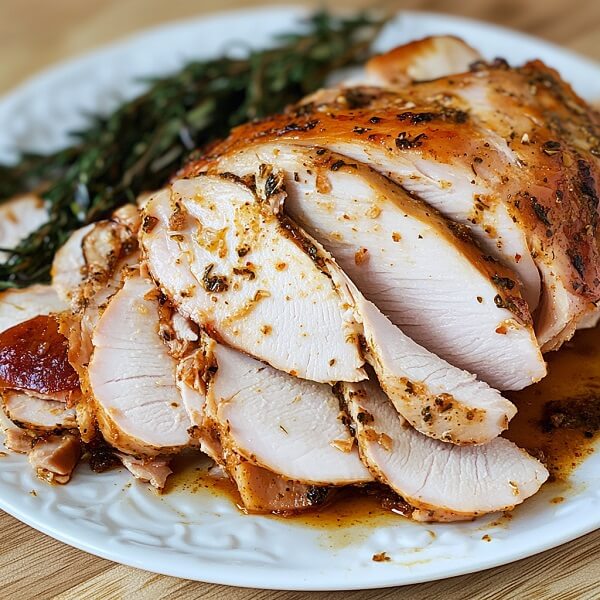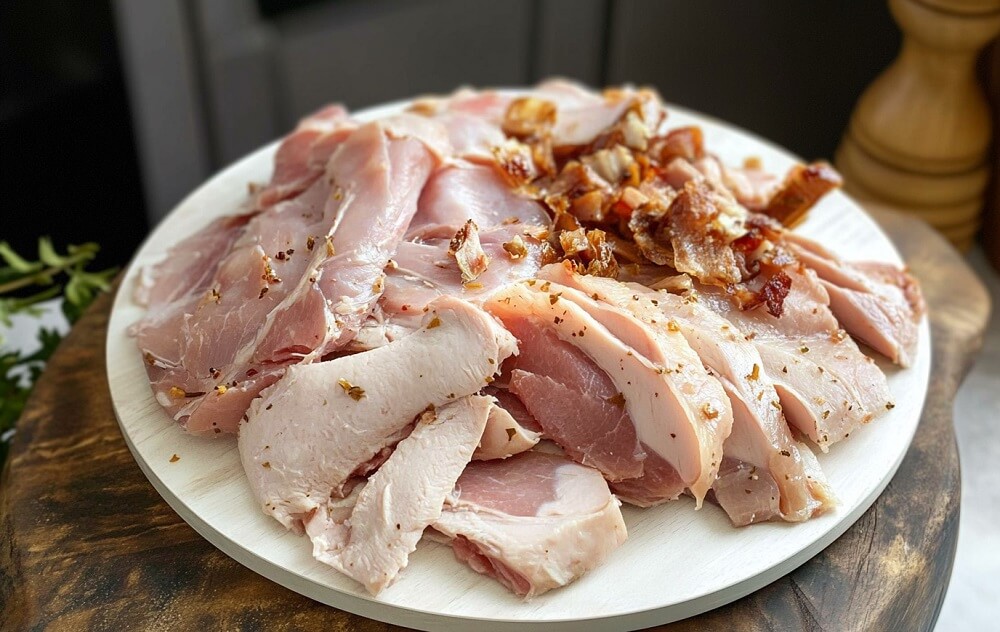Lunch meats are a staple in many households, providing quick and convenient options for meals. Among them, turkey lunch meat stands out as a popular choice due to its versatility and appeal.
- Importance in Daily Diets:
- Lunch meats are a go-to solution for easy and fast meal preparation.
- They are particularly favored for their ability to be incorporated into various culinary uses such as sandwiches, wraps, and salads.
- Overview of Turkey Lunch Meat:
- Deli turkey, prepackaged turkey, and smoked turkey are widely available, catering to different preferences.
- Known for its lean meat characteristics, turkey offers a flavorful yet light alternative to other lunch meats.
- Health, Taste, and Convenience:
- Turkey provides a balance of nutritional benefits with a satisfying taste.
- Its convenience makes it an ideal choice for quick lunches and versatile recipes.
2. Nutritional Value of Turkey Lunch Meat
Turkey lunch meat offers an excellent combination of macronutrients and micronutrients, making it a nutritious option for meals.
Macronutrients
- Protein Content:
- Rich in high-quality protein, turkey slices support muscle growth and repair.
- Perfect for active individuals or those looking to maintain a balanced diet.
- Fat Content:
- Known for its lean meat characteristics, turkey contains minimal fat compared to alternatives like ham or roast beef.
- Helps reduce overall calorie intake without compromising on taste.
Micronutrients
- Vitamins and Minerals:
- Packed with essential B vitamins like B6 and B12, supporting energy production and brain health.
- Contains minerals such as zinc and selenium, crucial for immune function and antioxidant support.
- Low-Calorie Options:
- Ideal for diet-conscious individuals, turkey is naturally low in calories while being nutrient-dense.
Comparison with Other Lunch Meats
- Ham and Roast Beef:
- Turkey is often a healthier choice due to lower fat and sodium content.
- Chicken and Plant-Based Options:
- Offers similar nutritional value but with a unique flavor profile.
- A good middle ground between mild chicken and stronger-tasting meats.
Concerns and Additives
- While turkey is nutritious, some varieties may include preservatives like nitrates and processed meat additives. Opt for minimally processed options like organic turkey to avoid unnecessary food additives.
Potential Downsides of Turkey Lunch Meat
While turkey lunch meat offers significant nutritional benefits, it’s important to consider its potential downsides, especially when choosing processed options.
Sodium Content in Processed Turkey
- Many varieties of prepackaged turkey and deli-sliced turkey are high in sodium, which can contribute to:
- Increased blood pressure.
- Higher risk of heart disease when consumed excessively.
- For a healthier choice, opt for low-sodium turkey options and pair them with potassium-rich foods like salads or vegetables.
Additives and Preservatives
- Processed turkey often contains nitrates and nitrites as preservatives to extend shelf life and enhance flavor. These chemicals have been linked to potential health risks, including:
- Formation of harmful compounds during digestion.
- Potential associations with certain chronic diseases.
- Choosing organic turkey or minimally processed varieties can help reduce exposure to these additives.
Concerns About Ultra-Processed Foods
- Frequent consumption of ultra-processed turkey products may lead to:
- Increased calorie intake due to hidden sugars and fats.
- Reduced nutritional density compared to whole or minimally processed meats.
- It’s beneficial to balance turkey lunch meat with fresh, whole foods for a well-rounded diet.
Quality Differences
- Deli-Sliced Turkey:
- Often fresher, with fewer preservatives, but may still have added sodium.
- Prepackaged Turkey:
- Offers convenience but can include food additives and higher sodium levels.
- Reading ingredient labels can help identify products with cleaner, more wholesome ingredients.

5. Types of Turkey Lunch Meat
Turkey lunch meat comes in various forms to suit different preferences and dietary needs.
Deli-Sliced Turkey
- Freshly sliced from the counter.
- Often perceived as fresher and more customizable.
- Great for sandwiches or protein bowls due to its authentic flavor and texture.
Prepackaged Turkey
- Ready-to-use and convenient for on-the-go meals.
- Available in resealable packs, making it a practical option for busy lifestyles.
- Ideal for wraps and salads when time is limited.
Flavored Varieties
- Smoked Turkey:
- Infused with rich, smoky flavors for added depth.
- Pairs well with cheese and crackers or in gourmet lunch recipes.
- Herbed and Seasoned Turkey:
- Pre-spiced options like garlic-herb or black pepper turkey enhance taste.
- Offers variety without the need for additional seasoning.
By understanding the types and potential concerns, consumers can make more informed decisions about incorporating turkey slices into their diets. Let me know if you’d like further refinements!
6. How to Choose Healthy Turkey Lunch Meat
Selecting healthy turkey lunch meat is essential for balancing nutrition and taste. Here are practical tips to ensure you make the best choice:
Tips for Reading Labels
- Sodium Content:
- Look for products labeled as low-sodium or reduced-sodium to limit excessive salt intake.
- Preservatives:
- Avoid options with added nitrates or nitrites when possible. Choose products that use natural preservatives like celery juice.
- Fat Content:
- Opt for leaner cuts with lower saturated fat to support heart health.
Importance of Minimally Processed Options
- Minimize exposure to unnecessary food additives and processed meat concerns by selecting turkey labeled as:
- “All-natural.”
- “No artificial flavors or colors.”
Organic and Antibiotic-Free Choices
- Organic Turkey:
- Raised without synthetic pesticides or hormones, offering a cleaner protein source.
- Antibiotic-Free Turkey:
- Ensures animals are raised without the routine use of antibiotics, promoting better health for consumers and the environment.
Local and Ethically Sourced Products
- Supporting local farms not only reduces your carbon footprint but also ensures fresher, ethically raised meat.
- Look for certifications like Animal Welfare Approved for ethically sourced options.
7. Best Ways to Incorporate Turkey in Meals
Turkey lunch meat is incredibly versatile, making it an easy addition to various dishes.
Popular Uses
- Sandwiches and Wraps:
- Classic turkey and cheese sandwiches.
- Whole-grain wraps with deli-sliced turkey, avocado, and spinach.
- Salads and Protein Bowls:
- Add turkey slices to a bed of leafy greens for a high-protein meal.
- Incorporate into grain bowls with quinoa, roasted vegetables, and hummus.
Creative Recipes
- Turkey Pinwheels:
- Roll up prepackaged turkey with cream cheese and fresh veggies for a quick snack or appetizer.
- Quesadillas:
- Use smoked turkey with shredded cheese and salsa for a flavorful twist.
- Charcuterie Boards:
- Pair herbed turkey with crackers, nuts, and fresh fruit for a sophisticated platter.
Pairing Suggestions for Balanced Meals
- Combine turkey lunch meat with whole-grain bread, fresh veggies, and healthy fats like avocado for a complete, nutritious meal.
- Pair with light soups or side salads to create satisfying yet calorie-conscious dishes.
By incorporating these ideas, turkey lunch meat can become a delicious and health-conscious staple in your daily meals. Let me know if you’d like more recipes or pairing tips!
FAQs
Is Turkey Lunch Meat Healthy for Kids?
Yes, turkey lunch meat can be a healthy choice for kids when you select options that are low in sodium and free from nitrates and preservatives. Pair it with whole-grain bread and fresh veggies for a balanced meal.
Does Turkey Lunch Meat Help With Weight Loss?
Yes, turkey slices are low in calories and high in lean protein, making them an excellent choice for weight management. They can keep you feeling full longer while supporting muscle maintenance.
How Long Does Turkey Lunch Meat Last in the Fridge?
Typically, prepackaged turkey lasts 5–7 days once opened, while deli-sliced turkey should be consumed within 3–5 days. Always store it in an airtight container and check for signs of spoilage.
Are There Gluten-Free Turkey Lunch Meats?
Yes, many brands offer gluten-free turkey options. Check the label to ensure there are no added gluten-containing ingredients.
Can Turkey Lunch Meat Be Eaten Without Cooking?
Yes, prepackaged turkey and deli turkey are fully cooked and safe to eat without additional cooking. Ensure proper storage to maintain freshness.
9. Conclusion
Turkey lunch meat is a versatile and nutritious addition to a balanced diet, offering a wealth of health benefits. Its high protein content, low fat, and variety of micronutrients make it a popular choice for meals and snacks.
- Key advantages include its ability to support weight management, its compatibility with a range of dietary needs (e.g., gluten-free and low-calorie), and its convenience for busy lifestyles.
- While deli-sliced turkey and prepackaged turkey provide great options, it’s important to read labels and choose minimally processed varieties to avoid excess sodium and additives.
Making informed choices about the types and quality of turkey lunch meat allows you to enjoy its benefits while addressing potential concerns. Whether you’re preparing sandwiches, wraps, or creative recipes like turkey pinwheels, this lean protein can be a delicious and health-conscious staple in your diet.






